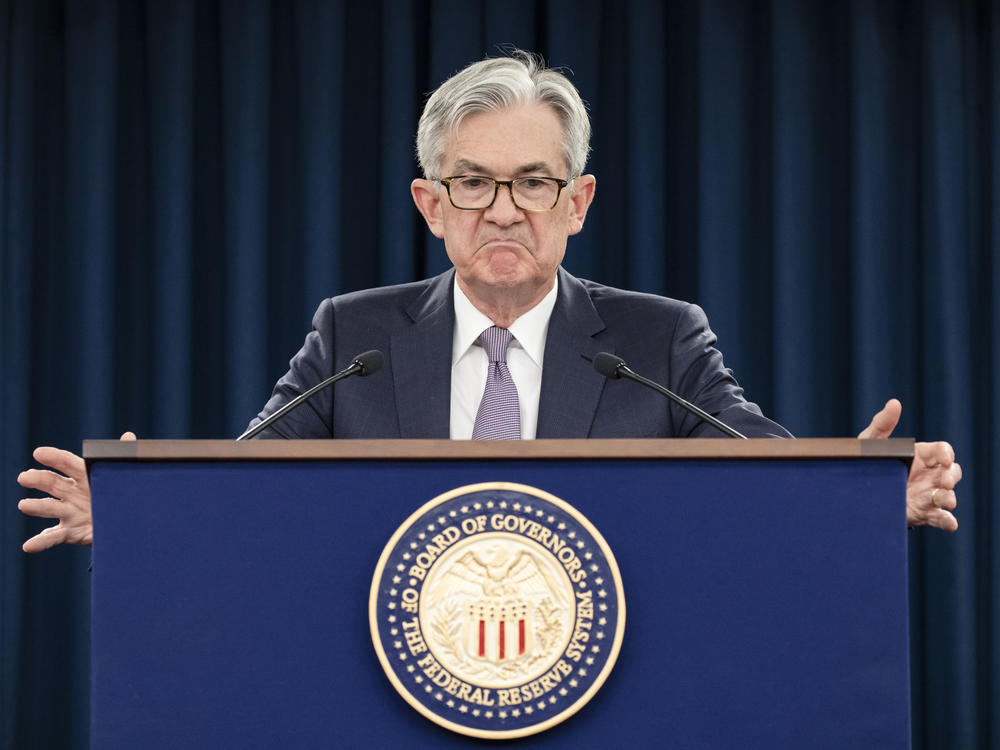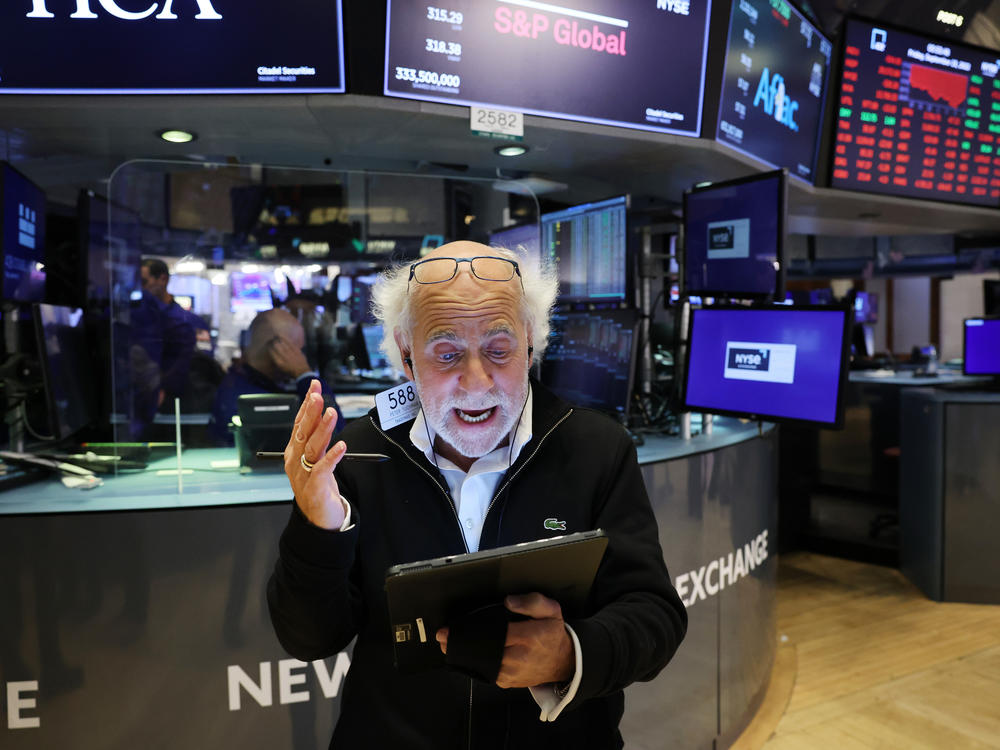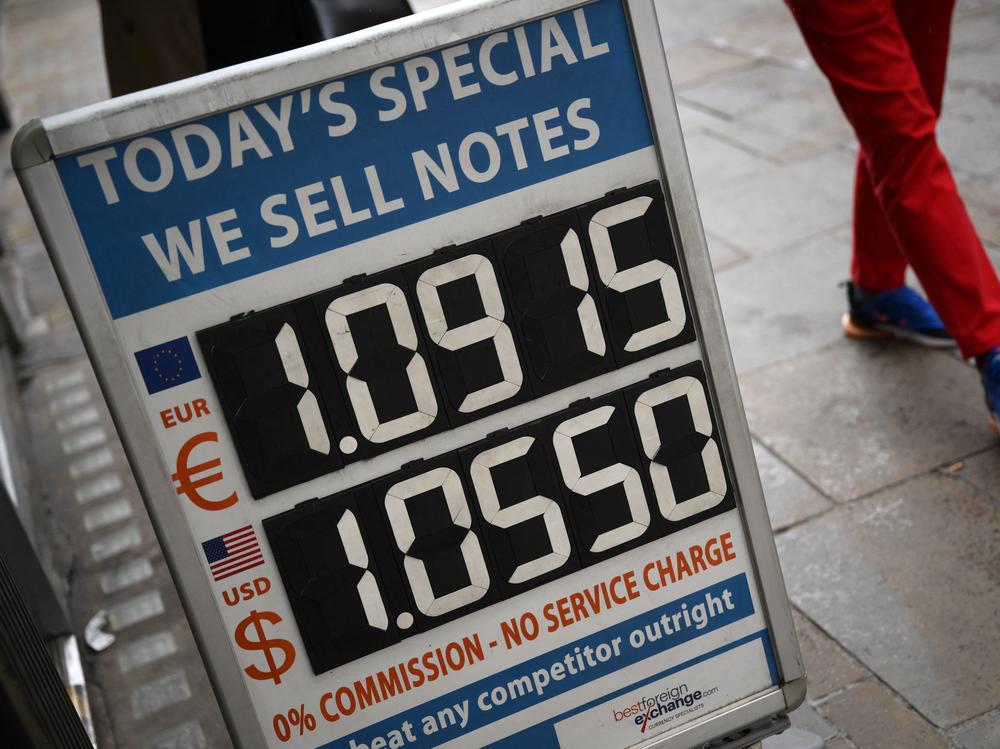Section Branding
Header Content
Financial markets are a mess around the world. Fingers are pointing at the Fed
Primary Content
Updated September 29, 2022 at 8:45 AM ET
Markets are a mess, and not just in the United States, where the three major stock indexes are down more than 20% each from their highs.
"Everything is starting to take a big hit," says Edmund Shing, the global chief investment officer at BNP Paribas Wealth Management.
Around the world, markets are reeling with unpredictability. The values of currencies are plunging. Oil and other commodities are getting hammered. There is fear and panic in bond markets, and on stock exchanges in Frankfurt, Tokyo, and Shanghai. President Joe Biden has met twice in the last week with his economic team, which includes the Treasury and Commerce Secretaries, for updates on the fast-changing global financial and energy markets.
And there seems to be almost global agreement about who is causing all this extreme and painful volatility: central banks, with the U.S. Federal Reserve in the lead.
That is a significant role reversal, and investors aren't happy with it.
One of the biggest brains in finance, Mohammed El-Erian, the chief economic adviser at Allianz, told CNBC on Monday that "this is about governments and central banks being sources of volatility, rather than volatility suppressors. They are adding to the volatility."
Customarily, the Fed and its counterparts in other countries do as much as they can to calm markets. Their goal is to keep the economy on track, or to put it back on track.
But instead of extinguishing economic and financial fires, according to many big investors, those steady and sturdy central banks are stoking them.
Why blame central banks?
To be sure, central bankers didn't start the fires. The pandemic, a war, and many other factors combined to create the biggest economic problem worldwide: high inflation.
Now, many of those factors are also causing other problems. The war in Ukraine is spawning an energy crisis in Europe. Supply chain disruptions continue to bedevil companies that have a global footprint.
What Wall Street wants is clear guidance about where central banks think the economy is heading, and what their plans are. But these days, they're not getting it.
"Markets had become, I think, overly cushioned by central bank guidance and central banks operating in an environment where they felt they could offer it with a reasonable degree of confidence," says Daragh Maher, the head of research for the Americas at HSBC.
But after some missteps, central banks are operating with more "humility," as Maher puts it, and that cushion is gone.
The Fed is among several institutions that assumed this bout of inflation would be a short-lived symptom of the pandemic. Instead it has turned out to be long-lasting and insidious. And now, the Fed appears much more humble about what it can and cannot do, the challenges and uncertainty it faces, and how confidently it can forecast.
"It's very difficult for central banks to offer guidance, because everything hinges on the data," Maher says. "And what's driving the data – energy prices, food prices – all of these things are really, really difficult to call, as we found out."
Another catalyst of the wild swings is the strength of the U.S. dollar, which has gotten stronger as the Federal Reserve has hiked interest rates aggressively.
"We are at a point where the U.S. dollar is acting like a wrecking ball, and hitting all the financial markets very, very hard," says Shin, of BNP Paribas Wealth Management, who notes the dollar has never strengthened as rapidly as it has this year so far.
While a strong dollar is good for American travelers and many U.S. companies, it also causes a lot of pain — particularly because so many transactions are done in dollars. Multinational companies that are headquartered in the United States, but do business elsewhere, take a hit when they convert money they have made in other currencies into dollars.
"A very weak currency against the dollar means that the inflation rates in the U.K. or the Eurozone are higher than they would otherwise be, because the value of the goods they import has just shot up in price, effectively," Shin explains.
Volatility isn't the concern - inflation is
In recent months, getting a handle on inflation has appeared about as easy as slowing down a revved-up Corvette that's skidding on an ice field with no brakes.
Still, after the Federal Reserve announced another big rate hike last week, its chairman, Jerome Powell, said the central bank will continue to raise rates in the hopes of ending high inflation, even if it pushes the country into a recession.
Like the Fed, other central banks are sticking to their guns.
Just this week, the British pound and the offshore yuan hit record lows against the dollar, and the United Kingdom and China stepped in to contain the fallout.
The Bank of England announced a new bond-buying program, and its governor promised he and his colleagues "will not hesitate to change interest rates by as much as needed" to do whatever it takes to get inflation under control.
It's the same story all over the world. Sweden's central bank just hiked interest rates, and so did its counterpart in Norway. The European Central Bank is expected to raise rates again at its next meeting.
Combine that monetary tough love with the fact that the dollar shows no signs of weakening, and it appears that uncertainty and volatility will be around for the near future.
At a conference on Wednesday, Dan Ivascyn, the chief investment officer at PIMCO, a firm that manages more than $1.8 trillion in assets, said he has been "hesitant to criticize the Fed and other central banks," because this has been such a "a remarkable and challenging period."
Right now, Ivascyn doesn't think it would be smart to bet against them.
"We think most central banks are pretty committed to getting inflation back towards target, even if that means the risk of a material slowdown in the economy," he said.
Copyright 2022 NPR. To see more, visit https://www.npr.org.



